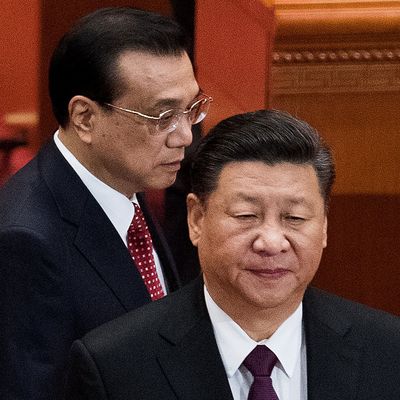
President Trump announced Tuesday that the United States will impose a 10 percent tariff on $200 billion worth of Chinese goods by August 30 — unless China curbs its (alleged) unfair trade practices and ceases its theft of American intellectual property. Those duties would come on top of the $34 billion of tariffs that went into effect last Friday, and the $16 billion scheduled for the coming weeks.
If the White House follows through on its latest tariff threat, nearly half of all Chinese imports to the U.S. will become subject to punitive taxes, a development that would raise prices for American consumers, while impairing China’s trade-dependent economy.
China’s Commerce Ministry said Wednesday that it was “shocked” by Trump’s escalation, and promised “to take necessary countermeasures.”
The challenge for Beijing is to figure out precisely what such countermeasures will look like. To this point, Xi Jinping’s government has been able to respond to Trump’s tariffs tit-for-tat by slapping tariffs on $50 billion worth of U.S. exports. But China can’t put duties on $250 billion worth of U.S. products — because it only imports about $130 billion of such goods each year.
Xi’s authoritarian government has plenty of alternative ways to hurt America corporations — among them, devaluing its currency (to disadvantage American exporters), disrupting U.S. supply chains by freezing activities at select ports, increasing inspections of American goods as they cross its borders, encouraging a consumer boycott of the U.S., or declining to approve acquisitions and mergers sought by American companies. Beijing has already, allegedly put a couple of these measures into practice.
And yet, these forms of retaliation pose risks to the Chinese economy — and not only because Trump has threatened to meet them with yet another round of tariffs. Such nontariff trade barriers run afoul of international rules, and repel foreign capital that Beijing is eager to attract. Further, any course of action that extends the duration of the trade conflict between the U.S. and China threatens to chase American companies out of the latter. As The Wall Street Journal reports:
In recent days, Vice Premier Hu Chunhua, who oversees foreign investment, has instructed local governments to gauge how the biggest round of U.S. tariffs to date—25% duties on $34 billion of Chinese goods imposed on Friday—is affecting American businesses operating in China, the officials said. In particular, authorities are looking for signs of U.S. companies potentially moving facilities out of China, the officials said. That would be a blow to Beijing’s effort to attract foreign capital and keep people employed at a time of gathering economic gloom.
Washington and Beijing have conducted no (official) high-level talks since early June, when Commerce Secretary Wilbur Ross paid a visit to the Chinese capital. China is eager for the two sides to resume negotiations — as are many congressional Republicans.
“Despite the serious economic consequences of ever-increasing tariffs, today there are no serious trade discussions occurring between the U.S. and China, no plans for trade negotiations anytime soon, and seemingly little action toward a solution,” House Ways and Means Committee chair Kevin Brady said in a statement Tuesday. “I strongly urge President Trump and President Xi to meet soon face-to-face to craft a solution to establish fair and lasting trade between our two countries.”
For the moment, though, no talks are under way. And a mutually agreeable resolution might be difficult to find — because, unlike some of Trump’s other trade spats, his standoff with China has real stakes for both nations.
The official justification for America’s tariffs is to deter Chinese theft of American intellectual property. And by most accounts, Beijing has made a routine practice of such thievery — as part of its broader “Made in China 2025” project, which aims to position China as a dominant force in the high-tech industries of the future. Which is to say: Beijing is using violations of international trade rules in a bid to reshape the global economy in a manner that will weaken the West relative to China. This is the kind of conflict between an incumbent hegemon and rising challenger that produced shooting wars in previous eras of human history; it wouldn’t be shocking if it produced a mutually destructive economic conflict in our epoch.
When Trump fired the opening salvo of his trade war with China, many observers believed that Xi would have the upper hand. After all, the leaders of democratic nations are typically more sensitive to short-term economic pain (particularly, in an election year) than leaders of authoritarian nations who are officially empowered to rule for life. Further, one of Trump’s critical bases of support lies in the American farm belt, which depends on access to the Chinese market for its livelihood. This calculus may well prove true.
But the relative weakness of the Chinese economy — combined with the fact that the legitimacy of its tyrannical government rests on its capacity to deliver robust economic growth — might make Xi less tolerant of drawn-out trade war than previously anticipated. In interviews with the Journal this week, anonymous Chinese officials evinced considerable anxiety about the economic and geopolitical implications of such a conflict.
“The Chinese government understands that a full-scale trade war does more economic harm to China and would work hard to avoid it,” Wang Tao, chief China economist at UBS Group AG, told the Journal Wednesday.
Still, other China analysts believe that Xi will find outright surrender even more politically intolerable.
“It’s already past the point of no return,” Pauline Loong, managing director the Asia-Analytica research firm, told Bloomberg. “What’s next is not so much a trade war or even a cold war as the dawn of an ice age in relations between China and the United States.






























